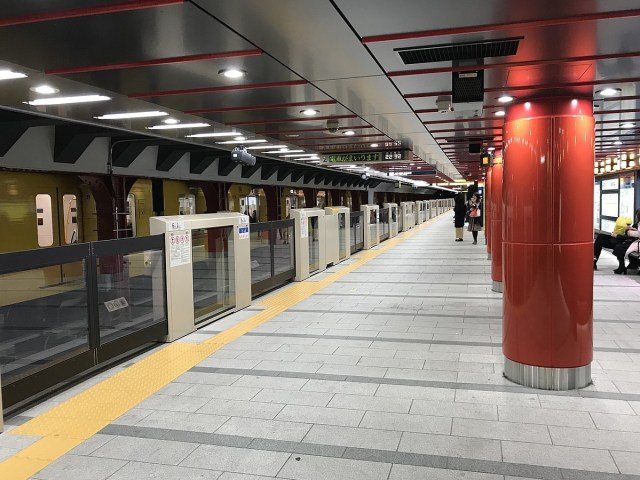
You might need to pack it in early or be prepared to go all night.
It’s pretty easy to spot the potential problem with this series of things about life in Japan.
1. The traditional way to spend New Year’s Eve is going to a temple or shrine late at night, so that you can be there as the clock strikes midnight and the new year begins.
2. In big cities, most people don’t own a car, and rely on public transportation to get around.
3. Trains and busses usually stop running around midnight, and don’t start again until sunup.
Thankfully, many rail operators make an exception to that third point and run a special schedule of extra trains in the early hours of January 1, so that people making their temple/shrine visits won’t be stranded and have to spend the night out in the winter cold. However, if you’re planning on taking the Tokyo Metro as part of your New Year’s Eve plans, you’ll probably need to find another way to get home, as the subway operator has announced that it will not be running any extra New Year’s trains this year.
From December 30 to January 3, Tokyo Metro trains will be operating under their standard weekend/holiday schedule, which generally has earlier last trains than on weekdays. So, for example, if you’re planning a New Year’s Eve visit to Tokyo’s most important temple, Sensoji, and to take the Tokyo Metro Ginza Line home from nearby Asakusa Station, your last train is going to be at 12:08, which really isn’t enough time to ring in the new year on the temple grounds and still make it onto the station platform in time to catch the last train.
This marks the second time in three years for Tokyo Metro to not run any extra trains for New Year’s Eve. In 2020 (i.e. December 31, 2019/January 1, 2020) the company was asked to refrain from doing so as part of stay-home countermeasures to prevent the spread of the coronavirus, and last year Tokyo Metro added extra trains only for limited sections of its Ginza and Marunouchi Lines.
For those who are planning a late-night temple visit or party on New Year’s Eve, it’s worth noting that Tokyo Metro isn’t the only public transportation provider in the city, and rail operator JR currently plans to run extra trains. If the Tokyo Metro is your preferred, or only, way to get back to your home or hotel, though, you might need to be prepared to shell out for a cab or pull an all-nighter.
Source: Norimono News via Livedoor News via Hachima Kiko
Top image: Wikipedia/Tokyo-Good
● Want to hear about SoraNews24’s latest articles as soon as they’re published? Follow us on Facebook and Twitter!
Follow Casey on Twitter, where he still remember falling asleep while standing up on a train after pulling an all-nighter.

 Tokyo subway ”phantom station” reveals itself to passengers for first time in nearly 90 years
Tokyo subway ”phantom station” reveals itself to passengers for first time in nearly 90 years Awesomely adorable Pokémon subway trains start service in downtown Tokyo【Photos】
Awesomely adorable Pokémon subway trains start service in downtown Tokyo【Photos】 Enjoy hanami cherry blossom viewing on the Ginza Line Sakura Train in Tokyo
Enjoy hanami cherry blossom viewing on the Ginza Line Sakura Train in Tokyo Tokyo subway bribes people with free noodles to get them to take earlier, non-rush hour trains
Tokyo subway bribes people with free noodles to get them to take earlier, non-rush hour trains Stay in a special Tokyo Metro train room at a hotel with a front seat to the railways
Stay in a special Tokyo Metro train room at a hotel with a front seat to the railways Seaside scenery, history, and so many desserts on Yokohama’s Akai Kutsu【Japan Loop Buses】
Seaside scenery, history, and so many desserts on Yokohama’s Akai Kutsu【Japan Loop Buses】 Foreigner’s request for help in Tokyo makes us sad for the state of society
Foreigner’s request for help in Tokyo makes us sad for the state of society Harajuku Station’s beautiful old wooden building is set to return, with a new complex around it
Harajuku Station’s beautiful old wooden building is set to return, with a new complex around it Japanese city loses residents’ personal data, which was on paper being transported on a windy day
Japanese city loses residents’ personal data, which was on paper being transported on a windy day Do Hi-Chew-flavor Hi-Chews have a reason to exist?【Taste test】
Do Hi-Chew-flavor Hi-Chews have a reason to exist?【Taste test】 Japan’s summertime towelket pillowcases are even better with the addition of Ghibli stars【Photos】
Japan’s summertime towelket pillowcases are even better with the addition of Ghibli stars【Photos】 Red light district sushi restaurant in Tokyo shows us just how wrong we were about it
Red light district sushi restaurant in Tokyo shows us just how wrong we were about it Akihabara pop-up shop sells goods made by Japanese prison inmates
Akihabara pop-up shop sells goods made by Japanese prison inmates Spy x Family anime cafe opening, non-secret agents welcome too
Spy x Family anime cafe opening, non-secret agents welcome too Ghibli Park now selling “Grilled Frogs” from food cart in Valley of Witches
Ghibli Park now selling “Grilled Frogs” from food cart in Valley of Witches McDonald’s new Happy Meals offer up cute and practical Sanrio lifestyle goods
McDonald’s new Happy Meals offer up cute and practical Sanrio lifestyle goods Japanese ramen restaurants under pressure from new yen banknotes
Japanese ramen restaurants under pressure from new yen banknotes French Fries Bread in Tokyo’s Shibuya becomes a hit on social media
French Fries Bread in Tokyo’s Shibuya becomes a hit on social media Studio Ghibli releases new action figures featuring Nausicaä of the Valley of the Wind characters
Studio Ghibli releases new action figures featuring Nausicaä of the Valley of the Wind characters New private rooms on Tokaido Shinkansen change the way we travel from Tokyo to Kyoto
New private rooms on Tokaido Shinkansen change the way we travel from Tokyo to Kyoto Tokyo Tsukiji fish market site to be redeveloped with 50,000-seat stadium, hotel, shopping center
Tokyo Tsukiji fish market site to be redeveloped with 50,000-seat stadium, hotel, shopping center Beautiful Ghibli sealing wax kits let you create accessories and elegant letter decorations【Pics】
Beautiful Ghibli sealing wax kits let you create accessories and elegant letter decorations【Pics】 Studio Ghibli releases Kiki’s Delivery Service chocolate cake pouches in Japan
Studio Ghibli releases Kiki’s Delivery Service chocolate cake pouches in Japan New definition of “Japanese whiskey” goes into effect to prevent fakes from fooling overseas buyers
New definition of “Japanese whiskey” goes into effect to prevent fakes from fooling overseas buyers Our Japanese reporter visits Costco in the U.S., finds super American and very Japanese things
Our Japanese reporter visits Costco in the U.S., finds super American and very Japanese things All-you-can-drink Starbucks and amazing views part of Tokyo’s new 170 meter-high sky lounge
All-you-can-drink Starbucks and amazing views part of Tokyo’s new 170 meter-high sky lounge More foreign tourists than ever before in history visited Japan last month
More foreign tourists than ever before in history visited Japan last month New Pokémon cakes let you eat your way through Pikachu and all the Eevee evolutions
New Pokémon cakes let you eat your way through Pikachu and all the Eevee evolutions Disney princesses get official manga makeovers for Manga Princess Cafe opening in Tokyo
Disney princesses get official manga makeovers for Manga Princess Cafe opening in Tokyo Sales of Japan’s most convenient train ticket/shopping payment cards suspended indefinitely
Sales of Japan’s most convenient train ticket/shopping payment cards suspended indefinitely Sold-out Studio Ghibli desktop humidifiers are back so Totoro can help you through the dry season
Sold-out Studio Ghibli desktop humidifiers are back so Totoro can help you through the dry season Japanese government to make first change to romanization spelling rules since the 1950s
Japanese government to make first change to romanization spelling rules since the 1950s Ghibli founders Toshio Suzuki and Hayao Miyazaki contribute to Japanese whisky Totoro label design
Ghibli founders Toshio Suzuki and Hayao Miyazaki contribute to Japanese whisky Totoro label design Doraemon found buried at sea as scene from 1993 anime becomes real life【Photos】
Doraemon found buried at sea as scene from 1993 anime becomes real life【Photos】 Tokyo’s most famous Starbucks is closed
Tokyo’s most famous Starbucks is closed One Piece characters’ nationalities revealed, but fans have mixed opinions
One Piece characters’ nationalities revealed, but fans have mixed opinions We asked a Uniqlo employee what four things we should buy and their suggestions didn’t disappoint
We asked a Uniqlo employee what four things we should buy and their suggestions didn’t disappoint Princesses, fruits, and blacksmiths: Study reveals the 30 most unusual family names in Japan
Princesses, fruits, and blacksmiths: Study reveals the 30 most unusual family names in Japan Messaging app LINE experiments with service to help pregnant women find seats on trains
Messaging app LINE experiments with service to help pregnant women find seats on trains Japanese police requests train stations in Shibuya to shut exits during New Year countdown
Japanese police requests train stations in Shibuya to shut exits during New Year countdown Check your Psycho-Pass levels at Shinjuku Station, but be careful, you might get eliminated!
Check your Psycho-Pass levels at Shinjuku Station, but be careful, you might get eliminated! Osaka Metro to test stores where you can pay with your face, even with a mask
Osaka Metro to test stores where you can pay with your face, even with a mask Tokyo Metro adds platform display showing where least crowded parts of the next train will be
Tokyo Metro adds platform display showing where least crowded parts of the next train will be Thousands oppose Osaka Metro’s plan to change major stations in giant boats and fabric swatches
Thousands oppose Osaka Metro’s plan to change major stations in giant boats and fabric swatches Australian arrested at Narita Airport for graffiti on Japanese train in Tokyo
Australian arrested at Narita Airport for graffiti on Japanese train in Tokyo Restaurant refuses to serve couples on Dec. 24 so singles won’t be reminded of their loneliness
Restaurant refuses to serve couples on Dec. 24 so singles won’t be reminded of their loneliness Woman in Tokyo gives birth onboard one of Japan’s busiest train lines
Woman in Tokyo gives birth onboard one of Japan’s busiest train lines Three common complaints foreigners have about Christmas in Japan, and how to make peace with them
Three common complaints foreigners have about Christmas in Japan, and how to make peace with them Anime-style magical girl video series promotes good subway manners…in Los Angeles?!?【Videos】
Anime-style magical girl video series promotes good subway manners…in Los Angeles?!?【Videos】 Smartphone app finds empty restroom stalls in Tokyo subway station, makes pooing easier than ever
Smartphone app finds empty restroom stalls in Tokyo subway station, makes pooing easier than ever Tokyo’s biggest street party spot bans public drinking on New Year’s Eve
Tokyo’s biggest street party spot bans public drinking on New Year’s Eve Tokyo’s Shibuya district bans public drinking on New Year’s Eve, cancels countdown celebration
Tokyo’s Shibuya district bans public drinking on New Year’s Eve, cancels countdown celebration New Welcome to Kanto Pasmo IC Card is the most kawaii way to ride trains on a trip to Japan
New Welcome to Kanto Pasmo IC Card is the most kawaii way to ride trains on a trip to Japan Japanese train company slammed for ad branding women “undignified” for applying makeup on board
Japanese train company slammed for ad branding women “undignified” for applying makeup on board
Leave a Reply